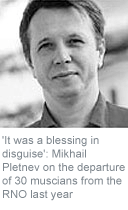Literature
Articles
Batons at Dawn
 How Vladimir Putin started a war between two of Russia's leading orchestras. By Vadim Prokhorov
How Vladimir Putin started a war between two of Russia's leading orchestras. By Vadim Prokhorov
The Guardian, Thursday March 18 2004
On Monday, when the Russian National Orchestra begins its tour in the UK, everything will look quite normal to the outsider. Mikhail Pletnev will be on the podium, conducting a group that bears the famous RNO trademark.
But what British audiences will see and hear is a new ensemble. Last summer, 30 musicians left the RNO and joined the National Philharmonic Orchestra of Russia (NPOR), created a year ago by the Russian ministry of culture for Vladimir Spivakov, the former music director of the RNO.
This story begins in 1999, when Pletnev, who founded the RNO in 1990, decided to resign as its music director and concentrate on piano performance and composition. He invited Spivakov, a violinist and founder of the Moscow Virtuosi, to fill the position. It was Spivakov's first symphonic music directorship.
However, Spivakov's leadership and his abilities as a conductor proved to be a disappointment. The players complained, saying that he impeded their creative growth. Deutsche Grammophon refused to collaborate with the RNO under Spivakov, and the pace of international touring - crucial to the group's finances - slowed.
In September 2002, a year before his contract was due to expire, Spivakov abruptly resigned from his position, citing disagreements with the orchestra's management. "I left the RNO," he says, "because the person who runs the RNO is not a musician but a former diplomat who has worked in Mexico - Sergei Markov."
Markov, the orchestra's executive director, gives a different explanation. A few days before Spivakov's decision to quit, Markov informed him that the orchestra would not renew his contract. "We always regarded Spivakov's directorship as a temporary measure forced by Pletnev's resignation," says Markov.
Then came a series of events that could have come straight from Soviet times.
Spivakov says: "In the half an hour after Channel 1 announced my departure, President Putin called me and said that he was saddened by the matter. He said he wanted me to stay in Russia and suggested I think of creating a new orchestra. Later, the minister of culture called me with an offer to create a new group, which would be a state orchestra." (The RNO, by contrast, is a privately funded organisation.)
In January 2003, minister of culture Mikhail Shvydkoi issued a decree establishing a new Moscow-based symphony orchestra, the Russian National Philharmonic Orchestra (RNPO) and appointed Spivakov as its music director. The decree also ordered $2m in funding for the ensemble.
The creation of a new orchestra, the name of which unambiguously echoed that of the Russian National Orchestra, coupled with Spivakov's statement that "the best musicians from the RNO will become the basis of the new orchestra", was viewed by many in Moscow as an attempt to replace the RNO with the RNPO, thus cashing in on the RNO's worldwide fame and prestige.
Not surprisingly, the RNO complained about the infringement of its trademark, and the name of the new orchestra was duly changed to the NPOR. "The first name was a temporary one," says Spivakov now.
A few months after the creation of the NPOR, Spivakov was also appointed president of the Moscow House of Music, an appointment that quickly became another point of contention. The RNO had planned its entire 2003-2004 subscription series for its new venue on the Moscow River. However, after Spivakov's appointment, that venue decided to renegotiate its contract with the RNO, resulting in the loss of two concerts and significantly poorer conditions for the other five.
The RNO is no stranger to adversity. The history of this orchestra, the first and only Russian group to be independent of government control, is tied to the revolutionary changes that followed the fall of the Soviet Union. During the last years of perestroika, a group of musicians approached Pletnev with the idea of establishing an orchestra that would be privately financed and self-governing, free from staff quotas and the repertoire limitations imposed by communist ideology.
The RNO was an immediate success. Banks and corporations - some Russian but mostly western - were signing up to sponsor them, with foundations and private philanthropists following. Gordon Getty, the Rothschilds and the Hearst family became major supporters, as did Edward Heath, Helmut Schmidt and Sophia Loren.
The reaction of the ministry of culture to all this success and critical acclaim in the west was, at best, lukewarm. Even now, after the RNO has become the first Russian orchestra ever to receive a Grammy in February 2004, Russian cultural officials have continued to keep the wall of silence around any of the RNO's events.
And worse than that, contends Markov, the ministry of culture - by creating and so generously financing the NPOR and other state orchestras - has imposed unfair conditions on the RNO. Of course, a critical point is that the NPOR enticed the musicians by offering a threefold increase in salaries. "We raised musicians' salaries as well," continues Markov, "but that has created quite a large deficit. We pay for everything. We even pay a tax on the use of the word 'Russian' in our name."
Despite all this, Pletnev returned as artistic director. "I came back," he explains, "because I didn't want to see the RNO fail. However, I returned in a new capacity - not as a principal conductor but as a leading member of a [newly established] conductor collegium." Other conductors who have agreed to join the collegium are Kent Nagano, Paavo Berglund, Christian Gansch, Vladimir Jurowski and Alexander Vedernikov.
"At first, the news that a third of the musicians had left the orchestra made me apprehensive," says Pletnev. "Now I'm really pleased with this development. The orchestra has been rejuvenated. The new musicians belong to a new generation and have a fresh vision of the music. So all this was a kind of blessing in disguise."
"The orchestra has a great future," agrees Mstislav Rostropovich, who led the RNO in its March concerts in Germany. "They have gone through the change of musicians without any loss of quality." The new and improved RNO has already performed in Austria, Switzerland, Germany and the US.
Meanwhile, Spivakov's NPOR made its debut last September. The critics' reaction was mixed. The newspaper Izvestia wrote: "From the first awkward sounds of the Fate motif of Tchaikovsky's Fourth Symphony, it was clear that Spivakov's NPOR was losing ground to Pletnev's RNO."
The irony is that if it were not for Pletnev's invitation and Spivakov's short-lived affair with the RNO, Spivakov would most likely never have acquired his own orchestra. Pletnev agrees that the situation with the NPOR - and even to some degree its creation - appears to have been of his own making. However, he says: "I feel no gratitude coming from Spivakov so far."
· The RNO performs at City Hall, Newcastle-on-Tyne, on Monday. Box office: 0191-261 2606. Then touring.
Featured Works:
Articles
Will Piano Lessons Make
My Child Smarter?
Lincoln Center Presents: Vita Nuova, a New Opera by Vladimir Martynov

